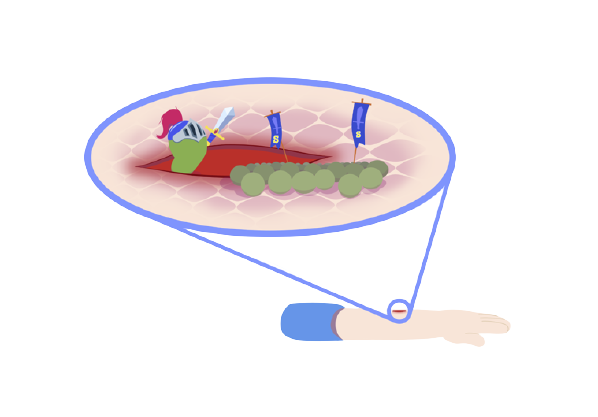
During this lesson, students will explore and learn about different types of angles. They will practice using a protractor to measure angles and classify angles based on their measurements. Read more »
Geometry and Measurement
Grade Level
Course
Subject
Standards

In this lesson, students will explore the odds of winning in games of chance and discover the problems associated with gambling. They will participate in a game of dice, read personal stories, and create their own PSAs about the dangers of gambling addiction. This lesson includes optional modifications... Read more »
Standard 12: Gambling
Related
Grade Level
Subject
Course
Standards

In this lesson, students analyze a variety of primary source documents in an effort to determine why the Southern states seceded from the Union to form the Confederate States of America. Using the evidence they compile, students craft Claim, Evidence, Reasoning statements to explain the Southern states'... Read more »
The Civil War
Subject
Course
Grade Level
Standards

Women's Rights Movement
Grade Level
In this lesson about the women's rights movement, students familiarize themselves with the experiences of women in the 19th century. Next, students interact with a short video summarizing the significance of the Seneca Falls Convention and the Declaration of Sentiments as the formal kickoff of the women's... Read more »
Women's Rights Movement
Subject
Course
Grade Level
Standards

In this lesson, students will examine the facts associated with evolution, make inferences about an organism based on fossilized remains, explore how evolution is influenced by the environment, and construct a timeline of an organism's evolution as a result of environmental factors or human impact over... Read more »
The Foundations of Evolution
Subject
Course
Grade Level
Standards

Hierarchical Organization of Multicellular Organisms
Grade Level
This lesson is part of a series titled "Woman Crush Wednesday" in which we look at how female scientists have shaped our view of science. In this biology lesson, students will explore the contributions of Terese LaRose, a histotechnologist. Students will learn about the different levels of organization... Read more »
Hierarchical Organization of Multicellular Organisms
Related
Subject
Course
Grade Level
Standards

Comparing Communities
Grade Level
During this fourth lesson in the Connecting Social Issues and Health Inequities unit, students will view Oklahoma's life expectancy map, identify environmental threats that contribute to these life expectancies, and discuss what these threats mean with regard to air quality and society. Students then... Read more »
Comparing Communities
Grade Level
Subject
Course
Standards

It is recommended that this lesson be taught after students learn the basics of genetics concerning alleles, dominant versus recessive genes, basic Punnett squares, and protein synthesis. In this lesson, students apply what they have learned about genetics to a real-world scenario, centering on codominance... Read more »
Biology
Related
Subject
Course
Grade Level
Standards

The Internment of Japanese Americans During World War II
Grade Level
This lesson addresses the circumstances that led up to the internment of Americans of Japanese descent during World War II. It asks students to consider the impact that internment had on the lives of those who were detained. Students will have opportunities to look at photos from internment camps and... Read more »
The Internment of Japanese Americans During World War II
Grade Level
Subject
Course
Standards

This lesson is designed to view the benefits of natural selection occurring in one species (bacteria) having an adverse effect on another (humans). It also teaches students how to extrapolate and interpret the meanings of graphs and predict solutions based on that data. Read more »
Natural Selection and Adaptation
Subject
Course
Grade Level
Standards

Students will work through various activities to gain a working understanding of facts versus opinions. Students will use nonfiction text to learn facts about a historical figure and then use facts to support their opinion about the person in a “battle”. Students will be able to distinguish the... Read more »
Using Facts to Support an Opinion
Subject
Grade Level
Standards

Is lettuce interesting? The answer depends on whom you ask. Whether the subject of lettuce is personally captivating or not, a good essay on the subject requires a thesis statement to organize the text and to keep the reader oriented and focused. A strong thesis statement not only helps the reader,... Read more »
Writing a Thesis Statement
Subject
Course
Grade Level
Standards

In this lesson, students will analyze the impact of the Treaty of Versailles. Students will extend their learning by analyzing an article about German reparations. Student learning will be assessed by completing a Claim, Evidence, Reasoning response to a question about the treaty's impact on Germany. Read more »
Evaluating the Treaty of Versailles
Subject
Course
Grade Level
Standards

In this lesson, students explore factors leading up to the passage of the 1882 Chinese Exclusion Act and reflect on the impact it had on Asian Americans. Students work in pairs to analyze a document packet and complete a H-chart that synthesizes the documents to answer an overall essential question. Read more »
The Chinese Exclusion Act
Grade Level
Subject
Course
Standards

Causes and Effects of the Congress of Vienna
This lesson introduces students to the impact of the Congress of Vienna. This lesson is meant to be taught after the French Revolution and Napoleon content has been introduced to students. Using hands-on activities, discussions, and research, students explore the individuals who helped shape the Congress... Read more »
Causes and Effects of the Congress of Vienna
Subject
Course
Standards

In this lesson, students discuss and analyze the ways in which genetics and the environment play a role in human development. Students participate in a Four Corners activity, a Card Sort, and an article analysis, and then extend their learning by viewing a video about an experiment that separated triplets... Read more »
Nature vs. Nurture
Grade Level
Subject
Course
Standards

Students will understand the events and ideologies that led to the establishment of federally funded and religious boarding schools for American Indians. Students will examine the boarding school experiences of American Indians from Oklahoma and other states and territories, and they will identify the... Read more »
American Indian Boarding Schools
Subject
Course
Grade Level
Standards

This lesson will introduce students to the impact of the Cold War within the United States. This lesson is meant to be taught after the WWII content was introduced to students and can be used in tandem with multiple cross-curricular lessons in LEARN. Using hands-on activities, discussions, and research,... Read more »
Effects of the Cold War
Grade Level
Subject
Course
Standards
In this lesson, students will review, analyze, and evaluate the history of Native American education, focusing on boarding schools (specifically Carlisle Indian Industrial School), terminology, and their transformation over the past 150 years. Students will analyze primary sources from the past, learn... Read more »
Assimilation
Grade Level
Subject
Course
Standards

Putting It All Together: Layout and Final Product
Grade Level
In this fourth and final lesson of "The K20 Chronicle" journalism unit, students will have an opportunity to peer review/edit a classmate's article, learn about magazine/newspaper layouts, preview examples and non-examples of proper layouts, hear from two graphic artists on how they came to be in the... Read more »
Putting It All Together: Layout and Final Product
Related
Grade Level
Subject
Course
Standards

In this lesson, students will examine President Hoover's response to the Great Depression and how that affected the presidential election of 1932. Students will analyze videos, Great Depression slang, and a reading to determine the reasons that Hoover did not win reelection for president. Students will... Read more »
The Great Depression and President Hoover
Grade Level
Subject
Course
Standards

This lesson will introduce students to the Second Red Scare (also known as the era of McCarthyism), the House of Un-American Activities Committee (HUAC), and the public fear of communism that ran rampant in the 1940s and 1950s. Students will analyze a political cartoon that addresses the public fear... Read more »
The Impact of the Second Red Scare
Grade Level
Subject
Course
Standards

This labor movement lesson guides students through an exploration of how collective action transforms society, using the United Farm Workers Union and Delano Grape Strike as a compelling historical case study. Students begin by grappling with César Chávez's provocative assertion that "perfect participation"... Read more »
The United Farm Workers Union and the Delano Grape Strike
Related
Grade Level
Subject
Course
Standards

In this lesson, students analyze the legislation enacted immediately following the Civil War and examine the effects that legislation had, especially on newly freed slaves. Students will then make connections between the harsh realities of the Reconstruction Era and more current Civil Rights issues... Read more »
The Reconstruction Era
Grade Level
Subject
Course
Standards

This lesson is a basic introduction to setting up a chemical equation. This could be part of a unit for physical science and can be done as a refresher or opener in chemistry for chemical equations. Read more »
Chemical Reactions
Related
Grade Level
Course
Standards

This lesson introduces students to Emmett Louis Till's life and his lasting impact on American history. For decades, Jim Crow laws had enforced racial segregation across the South, during which time countless African Americans were killed in violent lynchings. Till's brutal murder became a turning point... Read more »
The Early Struggles Against Jim Crow
Grade Level
Subject
Course
Standards

In this lesson, students use an autonomous robot called a BeeBot. Students discover coding is a tool for learning to read and write step-by-step instructions. As students translate by verbalizing step-by-step instructions (sequencing) into real-world tasks, they also make connections to the process... Read more »
Coding and How-to Writing
Grade Level
Subject
Related
Standards

Students will make interactive artwork by creating circuits using Makey Makeys and their knowledge of conductive materials. Read more »
Interactive Art Made by Completing Circuits
Grade Level
Subject
Related
Course
Sponsor
Standards

This lesson will ask students to consider and respond to the following essential question: "Why should we remember the Holocaust?" First, students will investigate the events that happened during the Holocaust by examining an infographic and reading the testimonies of those who experienced it. Next,... Read more »
Stories of the Holocaust
Subject
Course
Grade Level
Related
Standards

In this lesson, students evaluate how the media played a role in the presidency and resignation of President Richard Nixon by exploring news articles and watching a video. Students extend their learning by analyzing the history of presidential impeachments. As a reflection to wrap up the lesson, students... Read more »
The Role of the Media in Nixon's Presidency
Grade Level
Subject
Course
Standards

In this visual arts lesson, students will look at examples of photo touch-ups, restoration, and mash-ups. They will practice by attempting to make a mash-up with provided practice images. As a class, students will discuss what they tried to do with the software to make it work, share any tricks learned,... Read more »
Digital Image Editing, Collage Art, and Fair Use
Grade Level
Subject
Course
Standards

This lesson focuses on events that led up to and occurred during the "Space Race" between the United States (U.S.) and the Union of Soviet Socialists Republic (U.S.S.R.). The lesson introduces students to the astronauts, cosmonauts, scientists, and politicians who played pivotal roles on both sides.... Read more »
The Space Race
Related
Subject
Course
Grade Level
Standards

Fire Ecology as a Management Tool for a Tallgrass Prairie Ecosystem
Grade Level
In this lesson, students explore the Tallgrass Prairie ecosystem and fire ecology as a management tool. They evaluate the prairie ecosystem's response to the impact of burning. Read more »
Fire Ecology as a Management Tool for a Tallgrass Prairie Ecosystem
Grade Level
Subject
Course
Standards

In this lesson, students will explore the history of the loss of land for Native American tribes and how policies in place further contributed to the loss. Students explore the Dawes Severalty Act of 1887, the Curtis Act, and the Burke Act and their lasting impacts. To extend their learning, students... Read more »
The Dawes Severalty Act of 1887
Grade Level
Subject
Course
Standards

Through this lesson, students will use math and equity to discover the equation solving for any circle's arc length and sector area while investigating food deserts and how they impact a community. Read more »
Arc Length and Sector Area of a Circle
Grade Level
Course
Subject
Standards

Through this lesson, students will utilize math and equity to discover the equation to solve for any circle's arc length and sector area while investigating food deserts and how they impact a community. Read more »
Arc Length and Sector Area of a Circle
Grade Level
Course
Subject
Standards

Chaucer's Wife of Bath Tale
Grade Level
In this lesson on The Wife of Bath’s tale from Chaucer’s Canterbury Tales, students will examine different perspectives of characters from the story. They will do a deeper dive on “What Women Want?” and the history of women’s movements. Read more »
Chaucer's Wife of Bath Tale
Grade Level
Subject
Course
Related
Standards

In this lesson students will learn the differences between a natural birth and a c-section. Students will first reflect on statements about the two types of birth and what they already believe. Then students will use the Honeycomb Harvest instructional strategy to explore natural birth and record guided... Read more »
Natural Birth and C-section
Subject
Course
Grade Level
Standards

Finding love or a loan can be tricky! In this lesson, students learn some basics on types of loans and lenders. To begin, students are given fictional characters and asked who they would rather lend money to. Then, students explore pertinent vocabulary through a word scramble and reading about standard... Read more »
Getting to Know Lending Practices
Grade Level
Course
Standards

How do we keep the library organized? In this lesson, students reflect on their prior knowledge of libraries and librarians using a KWL chart. Then, students practice shelving virtually before jigsawing a reading about Melvil Dewey and the Dewey Decimal System. After watching some videos on shelving,... Read more »
Library Training
Related
Grade Level

In this lesson, students learn to analyze relationships in bivariate data by exploring scatter plots and calculating the correlation coefficient. Prerequisite knowledge for this lesson includes z-scores using summation notation (sigma), mean (x bar), and standard deviation. Students build their understanding... Read more »
Correlation Coefficient
Related
Grade Level
Course
Subject
Standards

Do we really know what dinosaurs looked like? In this lesson, students learn about different dinosaurs and discuss society’s interpretation of their behavior and appearance based on the little evidence we have. Then, they will sketch different dinosaurs, using small models as a guide. Students will... Read more »
Art
Grade Level
Subject
Course
Standards

In this interactive lesson, students explore the purpose, types, and effects of taxes at the local, state, and federal levels. Through group research, real-world scenarios, and math-based problem solving, they learn how taxes fund public services and impact individuals and businesses. The lesson wraps... Read more »
Understanding Taxes
Grade Level
Subject
Course

In this lesson, students will be introduced to the basic terminology for understanding film language. Students will watch various film clips, discuss them, create their own storyboards, and ultimately use the new vocabulary to analyze how they contribute to the meaning of a short scene. Read more »
Formal Analysis of Film/Moving Images
Grade Level
Subject
Standards

In this lesson, students will learn about the research process by working together to solve a case by evaluating and connecting evidence. After reflecting on the types of questions they needed to ask to be successful, the class will then learn how to develop high quality research questions and receive... Read more »
Creating Research Questions
Subject
Grade Level
Standards

In this lesson, students explore Newton’s Laws of Motion through the lens of the Native Youth Olympics. By engaging in movement-based science stations and analyzing force, mass, and acceleration, students connect physics concepts to ancestral heritage and traditions. The lesson culminates with student-designed... Read more »
Forces and Motion
Subject
Course
Grade Level
Standards

While it is important for students to engage in classroom discourse in their social studies classes in order to develop understanding, purposeful and effective opportunities for students to share their thinking and reasoning do not happen on their own. They require deliberate planning and facilitation... Read more »
Target Audience
Calendar Placement
Group Size
Intention Or Purpose

Research indicates that teachers will likely bear additional duties and responsibilities outside the classroom. These added hours can potentially lead to stress and strain. This session is designed to bridge the two roles of coaching and teaching by understanding their similarities. Participants will... Read more »
Target Audience
Calendar Placement
Group Size
Intention Or Purpose

This professional learning session will focus on how to incorporate a love of reading and student choice into all classes. Participants will explore a variety of authentic strategies that support reading comprehension, substantive conversations, and student choice to gain a deeper understanding that... Read more »
Target Audience

Participants will learn how to plan and host "Game to Prepare for Life" events at their schools. They will experience sample booths that let them see what the event can feel like for students. Afterward, participants will reflect on the process and discuss some of the benefits and challenges of coordinating... Read more »
Target Audience
Calendar Placement
Group Size
Intention Or Purpose

Participants consider the benefits of discourse in science and explore three strategies that support discourse in the classroom by role-playing as students. They then discuss the benefits of each of the three strategies for incorporating discourse in their classroom. In small groups, participants discuss... Read more »
Target Audience
Calendar Placement
Group Size
Intention Or Purpose

In this session, participants explore themes from research on the benefits of extra/co-curricular activities and analyze the ways in which club activity design connects back to the research. Facilitators model guidance that participants can apply to their classrooms; this will provide educators with... Read more »
Target Audience
Calendar Placement
Group Size
Intention Or Purpose

This professional learning activity asks participants to reflect on the importance of the inquiry cycle. Participants will examine a school data case study, take on different lenses for interpreting data, and explore what research tells us about the inquiry cycle and how it can support schools in making... Read more »
Target Audience
Calendar Placement
Group Size
Intention Or Purpose

This session dives into the world of Artificial Intelligence (AI) and its potential to revolutionize student success. It is designed to explore how various AI tools can extend educators' and counselors' reach beyond the classroom, providing personalized support and streamlining administrative tasks.... Read more »
Target Audience
Calendar Placement
Group Size
Intention Or Purpose

This professional learning session focuses on data-driven decision-making in the context of instruction. Participants will establish a definition the data-driven decision-making, identify the steps in the data-driven decision-making process, and explore the conditions and methods for successfully using... Read more »
Target Audience
Calendar Placement
Group Size
Intention Or Purpose

In this professional learning session, participants explore the structure of a 5E lesson. They evaluate a model lesson from LEARN, determining how each section addresses components of Authenticity. Participants then examine resources on the 5E Model and discuss their findings. Next, participants work... Read more »
Target Audience
Calendar Placement
Group Size
Standards

In this professional development session, teachers will explore how AI tools can function as personalized tutors to support student learning. They will learn to create effective tutoring prompts that guide students in asking meaningful questions and engaging with content independently. Teachers will... Read more »
Target Audience
Group Size
Intention Or Purpose
Related

Through small-group activities, research, and discussion, students will be exposed to a variety of careers, along with their average salaries, educational institutions, and postsecondary requirements. Students will learn about a variety of jobs in eight career clusters and the educational institutions'... Read more »
Target Audience
Calendar Placement
Group Size
Intention Or Purpose
ICAP (Individual Career Academic Planning)
College & Career Readiness Framework

Failure is not easy as we go through it, but it can be an important learning opportunity with the right perspective. By approaching these moments with a positive mental attitude, it is possible for someone to take these moments of failure and turn them into the foundation for later success. Read more »
Target Audience
Calendar Placement
Group Size
Intention Or Purpose

Students will listen to an engaging speech and record their thoughts. Students will then choose a topic of their interest and write down all they know about the topic in a two-minute paper. Students will learn more about preparing a speech and discuss their learning with their peers. They will create... Read more »
Calendar Placement
Group Size
Intention Or Purpose
College & Career Readiness Framework
Related

Students who become financially responsible in college will develop good spending habits that will last a lifetime. This activity enables students to understand ways in which they can change their spending habits, so that they will save money throughout college and in the years that will follow. Read more »
Calendar Placement
Group Size

In this lesson, students will explore the history and societal impact of fraternities and sororities. Students will explore new vocabulary and read about the history behind multicultural Greek organizations. They will then watch interviews with members of Greek organizations who share their personal... Read more »
Target Audience
Calendar Placement
Group Size
Intention Or Purpose
ICAP (Individual Career Academic Planning)
Family Engagement
College & Career Readiness Framework

